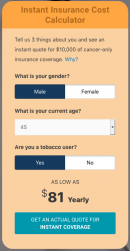Pre-clinical trials of leading prostate cancer drug finds potential to increase effectiveness by 40%.*
“Prostate cancer is a real risk and thanks to great medical care most men will survive. This discovery means the chances of survival will likely even be greater in the future.”
Jesse Slome, director of the American Association of Critical Illness Insurance
Prostate-cancer-treatment-breakthrough, June 23, 2020: A formulation of a prostate cancer drug will dramatically improve the quality of life for people suffering from prostate cancer. The new formulation of the drug Zytiga (abiraterone acetate) improves the drug’s effectiveness by 40 per cent.
Pre-clinical trials by the University of South Australia enables a smaller dose of the drug to be effective. The researchers also note it has the potential to dramatically reduce possible side effects, such as joint swelling and diarrhea.
Prostate cancer is a commonly diagnosed cancer in men. One in six men is at risk of diagnosis before the age of 85. This year, 192,000 new cases of prostate cancer are expected to be diagnosed in the United States. Globally, prostate cancer cases reached 1.28 million in 2018.
“Many drugs are poorly water soluble. When they’re ingested, the (drugs) enter the gut but don’t dissolve,” says Dr. Hayley Schultz, lead researcher. As a result, the therapeutic effect is limited. This is the case for Zytiga the doctor notes. According to the trial, only 10 per cent of the dose is absorbed. The other 90 per cent remains undissolved and simply passes through the body as waste.
Prostate cancer treatment makes drug more effective and less invasive
“On top of this, patients taking Zytiga must fast for two hours prior to taking the drug,” shared Dr. Schultz. “And another hour after taking the drug to achieve predictable absorption. And as you can imagine, this can be painstakingly inconvenient.”
“Our new formulation changes this,” Dr. Schultz adds in a report published by Science Daily. “By using oils we’re able to significantly increase the drug’s absorption, making it more effective and a far less invasive treatment for patients.”
Applied to human treatment, it could reduce the dose from 1000mg to 700mg per day, without the need for fasting. The team is seeking funding for clinical trials in humans.
Cancer planning is highly important for men
Prostate cancer treatment is good news for men. Planning can benefit many men age 40 or older. “Men like to deny that they face a risk of serious health issues like cancer,” shares Jesse Slome director of the American Association for Critical Illness Insurance. “Prostate cancer is a real risk and thanks to great medical care most men will survive. This discovery means the chances of survival will likely even be greater in the future.”
“The risks are real and they require pre-planning,” Slome advises. “Men who work will likely take time off from their jobs to undergo treatments.” A modest cancer insurance policy can cover healthcare costs. It can replace lost income to cover expenses while you undergo treatment and recovery time. It’s vital for men age 40 and older to consider.” A nominal cancer-only insurance policy costs less than a comprehensive critical illness insurance policy.

* Source. Science Daily, June 20, 2020
Worried about prostate cancer? Find costs for cancer insurance.
Men can use the Association’s Cancer Insurance Cost Calculator to see an instant cost for $10,000 of cancer insurance coverage. Then, read more about cancer and critical illness insurance. What these policies cover. How to decide what’s best for you.


